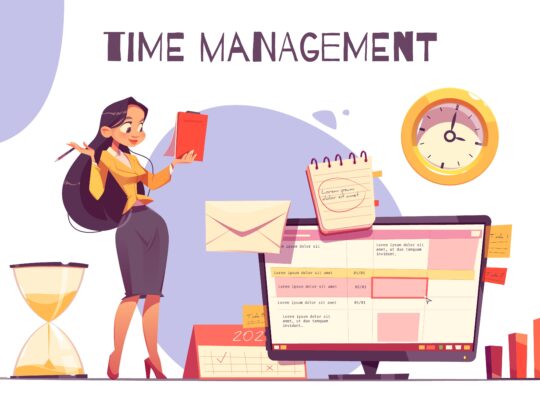| Get More Done In Less Time | ||
| Instructor: Chris Guillebeau and Madecraft | ||
| Released: 2/14/2022 | Course Details 47m Beginner | |
| Skills Covered Productivity Improvement | Course Link | |
| Professional Certifications and Continuing Education Units (CEUs) N/A | ||
| Do you have a hard time focusing and getting through your to-do list without losing time to distractions? You’re not alone. In this course, get expert time management advice from Chris Guillebeau, an author and entrepreneur who has unlocked the power of getting more accomplished without taking nearly as much time to do so. Chris walks you through the fundamentals of why focusing can ultimately feel challenging, providing ways you can shift your focus and avoid common pitfalls of distraction. He shares strategies that help you track your time, motivate yourself, and release unproductive habits. Finally, he shows you tips and tricks to help you stop procrastinating, remove unnecessary tasks from your plate, and recognize when you are most productive. After watching this course, you’ll feel empowered with an increased sense of focus and a readiness to start getting things done. Source: LinkedIN Learning | ||
Finding Time
Why you struggle
You struggle because you have not been trained.
Ask yourself these questions:
- Do I enjoy this?
- Is it meaningful?
- Would I do this if time and money were no object?
- What if I only had three years left?
The ultimate superpower
Your new superpower: knowing what to do next.
How can you gain more clarity in your projects? Do you know what steps to take next?
Minimum viable productivity
Doing the right thing is more important than doing anything efficiently.
Effective > Efficient
Minimum Viable Productivity
Choosing the effective thing rather than the efficient thing.
Find your why, and do more of that.
Multitasking fact and fiction
True multitasking is a myth.
Connect your projects and responsibilities to a context.
Focus your projects into blocks where you focus you intensity at only one things at a time.
Daily Practice
Keep it out of your head
Write things down. If things have multiple tasks associated with it, write it down into individual tasks.
Write it down, and get it out of your head. Keep things out of your head.
Plan three things a day
Working hard on the wrong things is a bad habit. Focus on just three big things each day. Define success differently.
Identify your three things every morning, or the night before.
Use sprint timers
Sprint Timer
Also called the Pomodoro method, is when you set a period of time to work. You set a time and don’t do anything else until the time is up. Then you take a five-minute break. When you return, you complete another timed session.
Example: 25 minutes with a 5 minute break
Tips:
- Don’t do anything else while the timer is running.
- Take the scheduled breaks, even if you don’t feel like it.
Schedule your priorities
Schedule your priorities on your calendar.
Managing energy, not time
Manage your energy for optimal performance.
- Notice patterns of when you have energy.
- Plan your work tasks around that.
Divide your activities into categories. Which ones require your full engagement? Which ones require low engagement?
Carrots and sticks
Try to do work that feels like a reward in itself. Positive reinforcement is more effective and healthier.
Do Less To Do More
Tracking 168 hours
You can influence how you spend your time.
Introducing the Time Tracking Spreadsheet
For at least one week, record how you spend every 30 minutes.
- Record 15 or 30 minute increments.
- Start sooner rather than later.
- Be as honest as possible.
Analyzing results
- You’re spending time on something unexpected.
- Others task take precedence over creative work.
- If the task isn’t necessary, reclaim that time.
After analyzing the date ask yourself:
- What can you cut?
- What can you schedule?
- What habits are working for you?
- Where can you cut yourself slack?
Get better at saying no
The inability to say “no” contributes significantly to feeling overwhelmed. You may also feel guilt and shame.
- Imagine the activity is taking place tomorrow.
- Start declining more invitations.
How to Say No
- “I want to make sure I do a good job with my existing commitments, and right now my plate is full.”
- “I’m a little overcommitted right now, and I don’t think I would do a good job with this thing you’re asking me.”
Give up petty control
Trying to control or micromanage is not only unproductive, it’s also going to make you unhappy.
Let go of things that don’t matter.
Super Productivity
Doing more of what’s important and letting go of smaller tasks.
Does this matter? How does this affect me?
Hard truths
Something you like to do is holding you back from doing something even better.
Choosing a small set of goals will make you more invested in achieving them.
Practice self-compassion
Learn to practice self-compassion. Forgive yourself when you’ve fallen short. What’s your motivation for self-improvement?
Four Step Process
- Acknowledge the feeling.
- Universalize it.
- Recognize it’s temporary nature.
- Be kind to yourself.
Tips and Tricks
Dreading a task
To-Dread List
Everything you don’t want to do, but have to do.
Before putting it on the To-Dread list, ensure it really needs to happen. Take a chunk of time to actively tackle those items. Work on your To-Dread list in batches.
Set hard but not impossible goals
Focus on accomplishments you can imagine yourself completing.
Don’t shy away from things because they seem hard.
Prune your calendar
Prune your calendar when you feel overwhelmed. Identify two tasks on your calendar that you can remove or opt-out with any consequence.
Discover your productive hours
Our peak hours of productivity are not the same. Take a quiz to determine your Morningness and Eveningness results.
Declare email bankruptcy
Try declaring email bankruptcy. Sample message provided to declare to email bankruptcy to the organization.
 | Remember! To experience the full benefit of this guide, I highly recommend you watch the full training session. |






